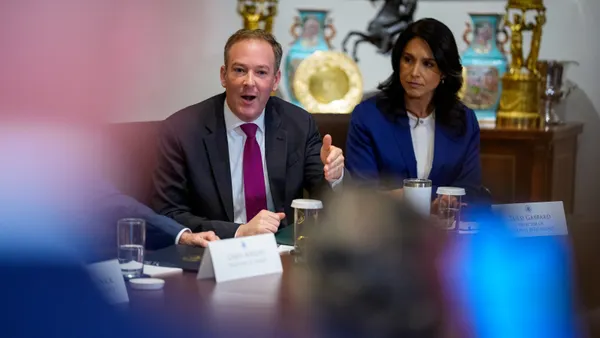Dive Brief:
- Countries comprising the United Nations International Maritime Organization agreed to a framework designed to reduce greenhouse gas emissions from the global shipping industry at a meeting of the IMO’s Marine Environment Protection Committee last week.
- The framework aims to get the global shipping sector to net-zero emissions by 2050 by introducing mandatory fuel standards that will force large shipping vessels to reduce the greenhouse gas intensity of their fuel over time, as well as an industry-wide carbon pricing mechanism, according to a Friday press release from the UN maritime organization.
- IMO called the deal “another important step towards establishing a legally binding framework” for the global shipping industry. The approval came after the Trump administration skipped the talks and expressed its opposition to any global carbon tax and threatened retaliatory measures in a letter to participants, according to multiple reports.
Dive Insight:
The UN maritime organization said the regulation is set to be formally adopted in October and will go into effect in 2027. At that point, “large ocean-going ships over 5,000 gross tonnage” will be required to comply. According to the organization, freight ships are responsible for emitting 85% of the international shipping industry’s total carbon emissions.
The global regulatory framework is meant to help the sector reach climate targets IMO set in its 2023 strategy on shipping industry emissions reductions, according to the release. The draft framework marks “another step in [the organization’s] collective efforts to combat climate change, to modernize shipping and demonstrates that IMO delivers on its commitments,” IMO Secretary-General Arsenio Dominguez said at the meeting’s closing remarks.
“We have an agreement on the basis on which we can work,” Dominguez said Friday. “Now, it is important to continue working together, engaging in dialogue and listening to one another, if we are to create the conditions for successful adoption of this agreement.”
The framework also creates a net-zero fund designed to collect emissions pricing contributions and disburse those revenues to “reward low-emission ships;” support developing companies in their transition; provide funding for training and technology transfer to support the strategy; and to “mitigate negative impacts on vulnerable states.
The organization said its net-zero standard is the first “to combine mandatory emissions limits and [greenhouse gas] pricing across an entire industry sector.” It is designed as an amendment to the International Convention for the Prevention of Pollution from Ships, or MARPOL. Currently, 108 parties representing 97% of global merchant shipping fleets by tonnage are a party to the international climate treaty. The portion of MARPOL the amendments will be added to also has energy efficiency requirements for ships.
The global fuel intensity standard will require the global shipping industry to reduce the intensity of fuel used over time, with the GHG intensity calculated using a “well-to-wake approach” that will encompass the entire lifecycle of the fuel. Those targets will have two levels of compliance, with companies needing to set base targets and direct compliance targets.
For ships that go above the direct compliance targets, they will be able to earn surplus credits. Ships above the required emission intensity thresholds will be allowed to use such surplus credits from other ships or banked credits to balance their deficits or acquire credits by making contributions to the net-zero fund.
Prior to the agreement, President Donald Trump’s administration sent a letter to members at the conference making it clear “the U.S. will not accept any international environmental agreement that unduly or unfairly burdens the U.S. or the interest of the American people,” according to Politico’s Europe bureau and The Wall Street Journal, which saw the letter.
The Trump administration said that should the measure go forward, the U.S. “will consider reciprocal measures so as to offset any fees charged to U.S. ships and compensate the American people for any other economic harm from any adopted GHG emissions measures.”
Trump has broadly pulled the U.S. out of global climate treaties and obligations since his inauguration in January. However, according to a recent release by the United Nations, the U.S. was not the only country opposed to the measure. At least 12 countries, including the U.S., were against the regulatory framework.
The adoption of the amendments are expected in October during a special meeting of the Marine Environment Protection Committee, with approval of detailed implementation deadlines expected in spring 2026, according to the IMO. It is expected to go into effect 16 months after its adoption, presumably sometime in 2027.











